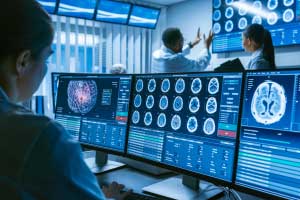Disclaimer: The information on our website is provided for general information purposes only. We make no representations or warranties of any kind, express or implied, about the completeness, accuracy, reliability, suitability or availability with respect to the website or the information contained on our website for any purpose. Any reliance on such information is therefore strictly at your own risk and we are not liable for any damages or losses arising out of or resulting from your reliance on any information contained on our website.
A neuropsychologist specializes in understanding the relationship between the brain and associated behaviors. They specialize in ways injury, illness, and diseases of the brain and nervous system alter behavior and cognitive function. If a person exhibits symptoms such as memory difficulties, emotional disturbances, learning difficulties, and other nervous system dysfunction, a neuropsychologist may be sought.
Watch a video to learn what a neuropsychologist does:
How to Become A NeuroPsychologist

Neuropsychologists must first earn a bachelors degree in a related field such as psychology, pre-med, biology, or neuroscience. Next, they must earn a doctorate degree and postdoctoral field experience related to neuropsychology. You should keep in mind that an undergraduate degree does not guarantee admission to a master’s or doctoral program. Therefore, maintaining the highest GPA possible, taking the Graduate Record Examination (GRE), and gaining letters of recommendation are important when applying to a program.
Doctorates degrees take anywhere from 3-7 years of additional schooling after your bachelor’s degree. Coursework includes neuroscience, diagnostic testing, neuroanatomy, etiologies, and neurological disorders. Practicums, dissertations, internships, and mentorship are also often included in these programs.
Each state has its only licensing requirements so be sure to look at your state’s requirements. Most require a doctorate degree, practicum experience, and passing the Examination for Professional Practice of Psychology. Though board certification is not required, it is highly recommended to strengthen your employment opportunities. The board certification is provided through the American Board of Professional Psychology, and its specialty board, the American Board of Clinical Neuropsychology.
Job Description of a Neuropsychologist
A neuropsychologist specializes in determining the difference in the brain in comparison to the norms for patient that have had injuries, chronic illness, cognitive deficiencies, or disorders. For example, injury and diseases such as strokes, traumatic brain injuries, Parkinsons, and dementia can all affect an individual’s neurological, cognitive, or behavioral responses.
A neuropsychologist administers and evaluates a variety of assessments to determine the differences in individuals compared to others their age and/or gender. Evaluations can include language assessments, mental exams, personality tests, and other cognitive tests. They also come up with treatment plans that can include medication, rehabilitation therapy, or surgery. These professionals are often called clinical neuropsychologists. Clinical neuropsychologists can work in a number of different healthcare settings such as hospitals, clinics, and physicians’ offices. Others choose to open private practices or work as consultants.
Some neuropsychologist’s choose to work for private or government research facilities or universities. Here, they conduct studies and research in regards to neurology that can help the medical field advance in our understanding of the brain and associated behaviors. Neuropsychologists must often collaborate with other medical professionals that may be treating the patient as well. A positive attitude and empathic demeanor are also helpful as these individuals must help patients cope and feel be empathy for their client’s struggles.
Teacher Resources
Neuroscience for Kids is a website with free resources that is maintained by Eric H. Chudler, Ph.D. and was supported by a Science Education Partnership Award (R25 RR12312) from the National Center for Research Resources (NCRR).
Neuropsychologist Career Video
Neuropsychologists study the relationship between human behavior and the brain. They diagnose and treat a wide variety of conditions related to the central nervous system, whether due to disease, injury, or age-related brain changes. They also treat children with learning disabilities. Neuropsychologists may test a patient’s intelligence, concentration, or memory, and interview patients to learn their medical history. They write detailed reports that integrate their patient notes and test results, then coordinate with doctors and other healthcare professionals to set a plan for the patient to thrive.
Neuropsychologists also teach and supervise students, interns, and other hospital staff. They conduct research and develop rehabilitation plans for patients recovering from, or adapting to, cognitive dysfunction. Clinical neuropsychologists provide psychotherapy, behavior therapy, and other counseling services to patients with neurological disorders or brain injuries. They diagnose and treat conditions such as chemical dependency, dementia, and exposure to environmental toxins. Neuropsychologists work in research facilities, colleges and universities, and rehabilitation centers. Most positions require a Ph.D. in a neuropsychology related field. Licensure and certification are required for some positions.
Article Resources
National Center for O*NET Development. 19-3039.01. O*NET OnLine.
